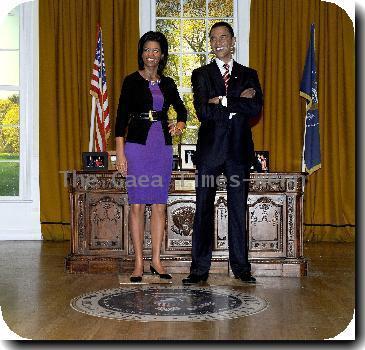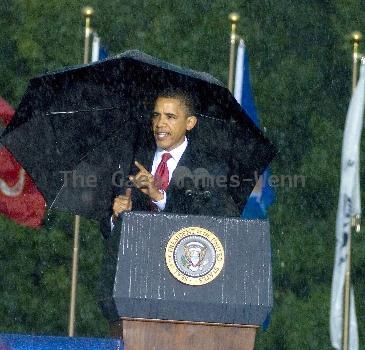Outgoing US ambassador concerned Venezuela’s agenda is focused on opposition to Washington
By Ian James, APWednesday, June 30, 2010
US envoy concerned about relations with Venezuela
CARACAS, Venezuela — The outgoing U.S. ambassador to Venezuela expressed concern Wednesday that President Hugo Chavez’s government has focused its agenda on opposing Washington and said he fears trade between the countries is fraying.
Ambassador Patrick Duddy, who will soon end his assignment in Caracas, said he hopes the two countries can improve cooperation in some areas. “But these are difficult times for the bilateral relationship,” he said.
The United States remains Venezuela’s leading trade partner and the top buyer of Venezuelan oil, though oil exports to the U.S. have slipped recently as Chavez has sought to diversify his customers.
Venezuela exported $28.1 billion in oil and other goods to the U.S. in 2009, according to U.S. Census Bureau figures — a 45 percent decline from the previous year as crude prices dropped and oil output declined. Venezuelan exports to the U.S. have since sharply increased in the first months of this year.
The country imported $9.3 billion in goods from the United States in 2009, a 26 percent decline from 2008.
“I am concerned that our long-standing commercial ties are weakening,” Duddy said. “I am concerned that the government of Venezuela has decided to define its economic, political and social agenda in terms of opposition to the United States, rather than seeking a positive course of cooperation with us.”
Chavez’s antagonism toward the U.S. has dominated his 11-year presidency, as he has accused successive U.S. governments of trying to undermine him and meddle in Latin America’s affairs.
“Let me be clear about something: We are not intervening in Venezuela,” Duddy told a gathering of dignitaries and journalists at U.S. Embassy.
Some American officials have criticized what they call an erosion of democracy under Chavez.
Duddy said a renewed emphasis on the principles of the Inter American Democratic Charter, which both countries have signed, would “tangibly contribute to improving our bilateral relationship.”
The diplomat also said the U.S. respects Venezuela’s sovereignty and its decisions to choose its trading partners as it pleases. But, he added, “It is hard to understand how the people of Venezuela … are going to benefit from a policy that explicitly wants to limit the long-standing relationship with the United States.”
He called it a shame Venezuela has seen a sharp decline in visits by American tourists, while noting that more than 1,000 Venezuelans show up at the U.S. Embassy most days to apply for travel visas.
Duddy arrived in 2007 and was expelled in 2008 by Chavez, who said it was in solidarity with Bolivia’s allied government after it ordered out the U.S. ambassador there, accusing him of helping the opposition incite violence. The administration of then-President George W. Bush denied the accusation and reacted by expelling the envoys of Venezuela and Bolivia.
Duddy was allowed back into Venezuela nine months after his expulsion, once President Barack Obama was in office.
The White House on Monday announced that Obama is nominating career diplomat Larry Palmer to succeed Duddy as ambassador. He must be confirmed by the Senate.
Palmer is president and CEO of the Inter-American Foundation, an independent U.S. government agency that supports non-governmental and community organizations in Latin America and the Caribbean. He previously was U.S. ambassador in Honduras and charge d’affaires in Ecuador.
Tags: Barack Obama, Caracas, District Of Columbia, Embassies, International Trade, Latin America And Caribbean, North America, Prices, South America, United States, Venezuela

